Cancer Biology
Imperial College London (ICL)
All 10 results
Sort by
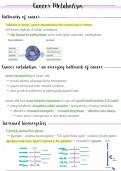
-
CBIO 5: Cancer Metabolism
- Lecture notes • 7 pages • 2023
- Available in package deal
-
- £8.49
- 1x sold
- + learn more
Lecture notes from Imperial College London, Medical Biosciences BSc course, 2nd year, Cancer Biology module. Cancer metabolism lecture notes: cancer cells adapt their metabolism to be able to grow and divide rapidly. Cancer cells grow and divide very rapidly, it is one of the established hallmarks of cancer. In order to be able to grow so quickly, often in environments which are less than optimal, cancer cells have adapted and evolved novel mechanisms to be able to acquire the sufficient ...
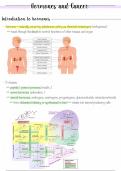
-
CBIO 7: hormones and cancer
- Lecture notes • 12 pages • 2023
- Available in package deal
-
- £7.99
- + learn more
Lecture notes from Imperial College London, Medical Biosciences BSc, 2nd year, Cancer Biology Module (CBIO). module learning outcomes: - describe the steroid hormone signalling pathway - list cancers regulated by hormones - outline architecture of nuclear receptors - describe strategies used to target oestrogen and androgen signalling, list different types of hormonal therapies - describe breast cancer pathology and the role of oestrogen receptors - describe roles of androgens in develo...
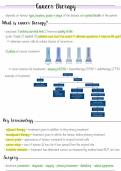
-
CBIO 8: cancer therapy
- Lecture notes • 10 pages • 2023
- Available in package deal
-
- £7.99
- + learn more
Lecture notes from Imperial College London, Medical Bioscience BSc, 2nd year, Cancer Biology (CBIO) module. The main pillars of cancer therapy are surgery, radiotherapy, chemotherapy, immunotherapy and targeted therapy. How a cancer patient is treated will depend on many factors including tumour type, location, grade and stage of the disease as well as the general health of the patient. A single treatment modality can be used alone to treat a patient or different treatments types may be...
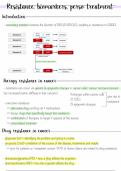
-
CBIO 9: resistance, biomarkers, personalised treatments
- Lecture notes • 8 pages • 2023
- Available in package deal
-
- £7.99
- + learn more
Lecture notes from Imperial College London, Medical Biosciences BSc, 2nd year, Cancer Biology (CBIO) module learning outcomes: - Define cancer therapeutic resistance - Explain some of the different mechanisms of drug resistance - Describe how cancer stem cells and epigenetic changes can give rise to drug resistance - Describe cancer biomarkers and the different ways biomarkers are used in cancer - Outline current strategies to discover biomarkers - Define personalised medicine and p...
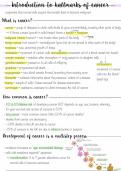
-
CBIO 1: hallmarks of cancer
- Lecture notes • 7 pages • 2023
- Available in package deal
-
- £7.99
- + learn more
Lecture notes from Imperial College London, Medical Biosciences BSc, 2nd year, Cancer Biology (CBIO) module learning outcomes: - Define key terms relating to cancer (words to describe cancer and cancer-related processes) - Explain the differences between a normal cell and a cancer cell - Outline the risk factors for cancer, and identify which are most relevant to common cancers - Describe the different steps that are required for a metastatic cancer to arise - Name the 6 hallmarks of c...
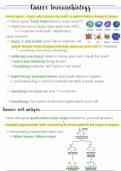
-
CBIO 6: cancer immunobiology
- Lecture notes • 7 pages • 2023
- Available in package deal
-
- £7.99
- + learn more
Lecture notes from Imperial College London, Medical Biosciences BSc, 2nd year, Cancer Biology (CBIO) module. Covers the main concepts related to cancer immunobiology, why cancer is not a simple disease for our intrinsic defences to defeat, which are the markers that characterise it, how viruses can cause cancer, how our immune system reacts to cancer but also how cancer can evade it. learning outcomes: - concept of cancer immunobiology - describe tumour antigens expressed on cancer cell...
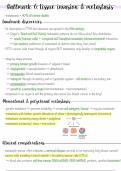
-
CBIO 4: Tissue invasion & metastasis
- Lecture notes • 8 pages • 2023
- Available in package deal
-
- £7.99
- + learn more
Module notes from Imperial College London, Medical Biosciences BSc, 2nd year, Cancer Biology (CBIO) module Cancer cells can break away from their site or organ of origin to invade surrounding tissue and spread (metastasise) to distant body parts. At those new sites, cancer cells can form new tumours (metastases). These metastatic tumours are estimated to be responsible for around 90% of cancer deaths, an estimate that hasn’t changed much in the last 50 years. These notes describe the key ...
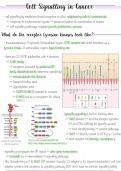
-
CBIO 3: cell signalling in cancer and apoptosis
- Lecture notes • 8 pages • 2023
- Available in package deal
-
- £7.99
- + learn more
Lecture notes from Imperial College London, Medical Biosciences, 2nd year, Cancer Biology (CBIO) module A crucial characteristic of every living cell is its ability to communicate with neighbouring cells. This interchange of information between a cell and its environment is what is known as cellular signalling. Specifically, a cell must be able to give precise responses to the environmental signals that it is continually receiving. Cell signalling pathways regulate all the key processes in...
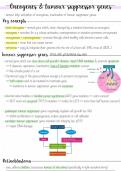
-
CBIO 2: oncogenes and tumour suppressor genes
- Lecture notes • 5 pages • 2023
- Available in package deal
-
- £7.99
- + learn more
Lecture notes from Imperial College London, Medical Biosciences BSc, 2nd year, Cancer Biology (CBIO) module For a cancer to be initiated, certain changes must take place within the genes of a cell. These genes usually control the process of cells growing and reproducing only as required, in an orderly and controlled way (cell proliferation, differentiation, and survival). Studies of tumour viruses revealed that specific genes (called oncogenes) are capable of inducing oncogenic cell changes, ...
Complete and detailed notes on the cancer biology course at Imperial College London. Obtained 86% using those notes only. Colours, images, drawings, graphs, figures, tables included.

How did he do that? By selling his revision notes on Stuvia. Try it yourself! Discover all about earning on Stuvia


